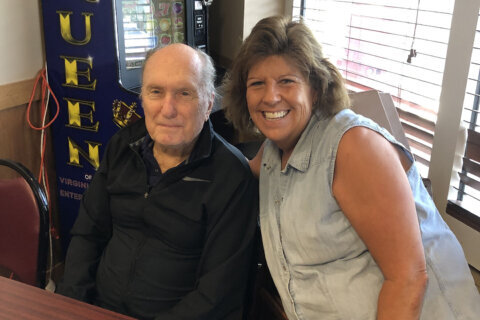For the first-ever ombudsperson in the Loudoun County Public Schools — Virginia’s third-largest school district, highly ranked and scrutinized in recent years — a large part of the job involves not saying a word.
In her first interview since LCPS’ announcement of her hiring, Carey Williams told WTOP her role as the designated impartial resource for students, parents, employees and community members starts with finding out what the problem is.
“When I talk to a visitor, and really, truly listen to their concerns, I think that’s the first step — clarifying what the concern is, allowing the time and space for them to feel heard, and then coming up with multiple options or pathways,” said Williams.
As the county’s inaugural ombudsperson, Williams has promised to advocate for fairness, equity and consistency, in order to help resolve education, student and employee-related concerns, problems, complaints and issues.
Williams said she could envision hearing concerns from families about equity, special education, disciplinary policies, and facilities. From employees, Williams could hear about interpersonal conflicts between employees, evaluations, or concerns about workload.
“I do not advocate for any particular party or individual, but I do advocate for a timely, fair and equitable process,” said Williams, whose previous positions include coordinator for equity and student conduct for Fairfax County Public Schools and Title IX investigator for Prince William County Schools.
Williams will follow the four ethical principles of the International Ombudsman Association: independence, impartiality, confidentiality and informality.
Although she’s an employee of the school system, she said her role is structured to minimize potential conflicts of interest: “I report directly to the Chief of Staff, and I don’t fall within the reporting structure to any other office, and that’s to help keep that impartial neutrality, so that I don’t have any other obligations or job duties that are going to pull me in a different direction or sway the way I respond to a concern.”
An impartial resource to help resolve issues
Williams is inviting students, parents, employees or community members to send her an email at ombuds@lcps.org if they want help in resolving an issue that’s affecting student success or the school/work environment.
Loudoun County Public Schools boasts a 97.6% graduation rate — the highest among large school divisions in the state. It’s also in the midst of a special grand jury investigation by Attorney General Jason Miyares, which began in April of this year, looking into how the school system handled two sexual assaults by the same high school student.
Amid the investigations, lawsuits, the often-rambunctious school board meetings, and Gov. Glenn Youngkin’s push for more parental involvement in public education, Williams’ role could help smooth issues with less conflict.
“As an informal space, the hope is that individuals will reach out to me prior to escalating their concerns through a more formal manner,” said Williams. “That may be the direction that we go — that may be one of the options I provide.”
After exploring options Williams might offer, if a parent or employee wanted to file an official complaint or take legal action, she would point them in the right direction: “I would help guide the visitor to the correct policy, procedure or way to make that formalized notice, if that’s the direction they would like to go.”
Williams wouldn’t impose discipline or overturn disciplinary decisions, but would provide information on how the parent, student or employee could get that reconsideration.
While some will choose to make their points in public displays, or through legal filings, Williams wants to make sure visitors are able to explain their concerns.
“Oftentimes, when individuals feel they are not being heard, it might be because they’re voicing their concerns isn’t the right venue,” said Williams. “They’re not having the dialogue that they’re hoping to have — I think that’s a great place to start.”
For confidentiality purposes, Williams won’t keep full notes about her conversations, or maintain any specifics on file. Her goal is to empower her visitors with information on how to properly resolve their concerns.
“They might want to role play — some people don’t like conflict or crucial conversations,” said Williams. “So, I might be able to sit down and role play with them, to help prepare for the next meeting that they might be having.”
Williams said most ombuds prepare a yearly or bi-yearly report, with general numbers and trends, without any specifics, “to just know whether most of the concerns are coming from students, employees, family members, or community members, and what are the general topics.”








